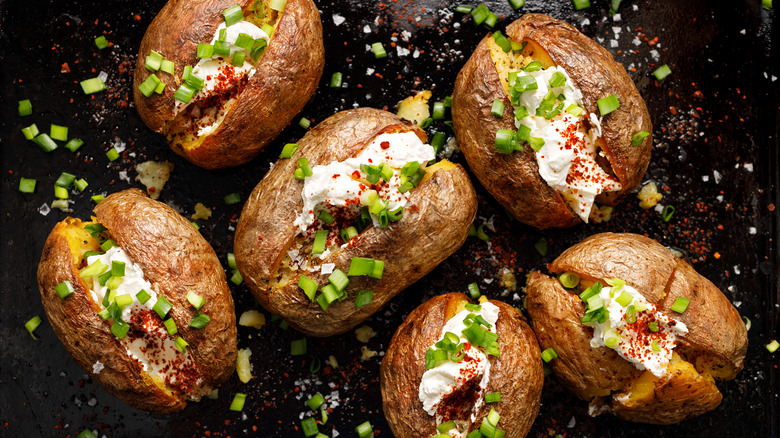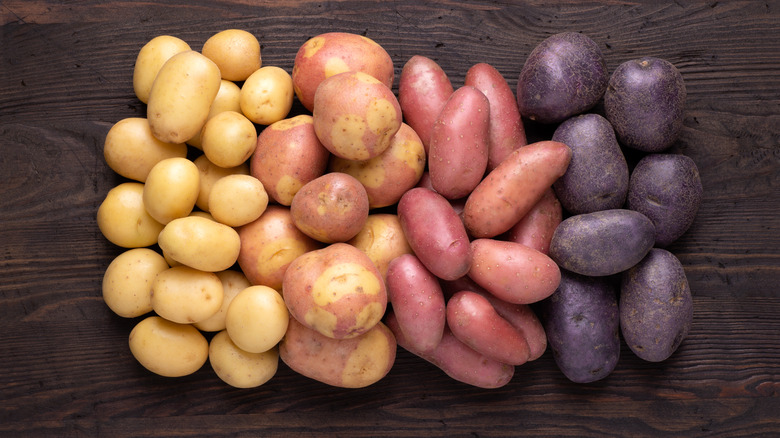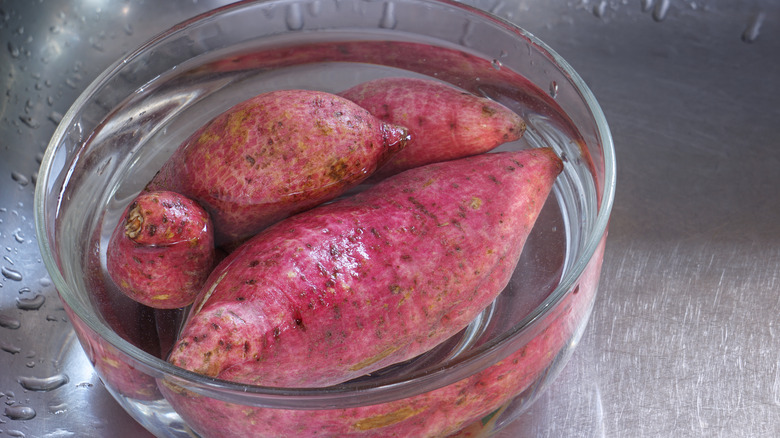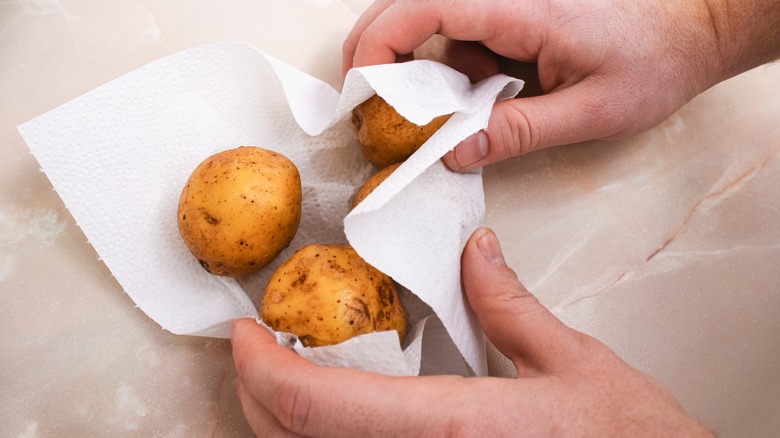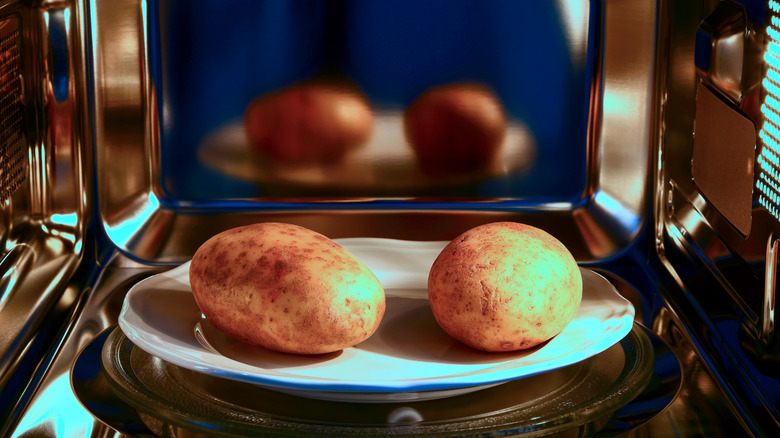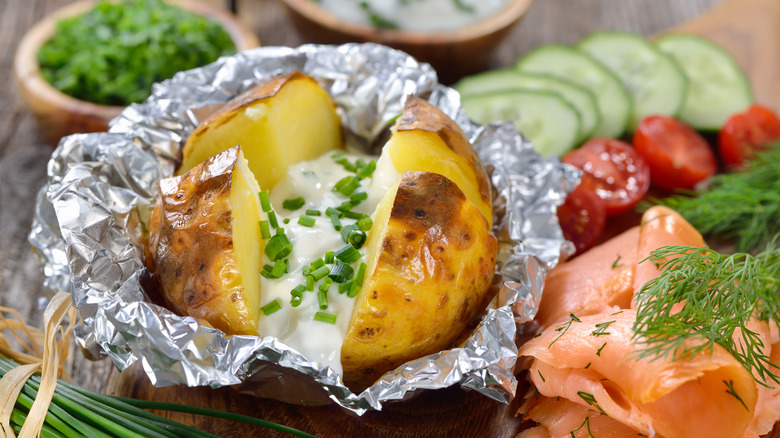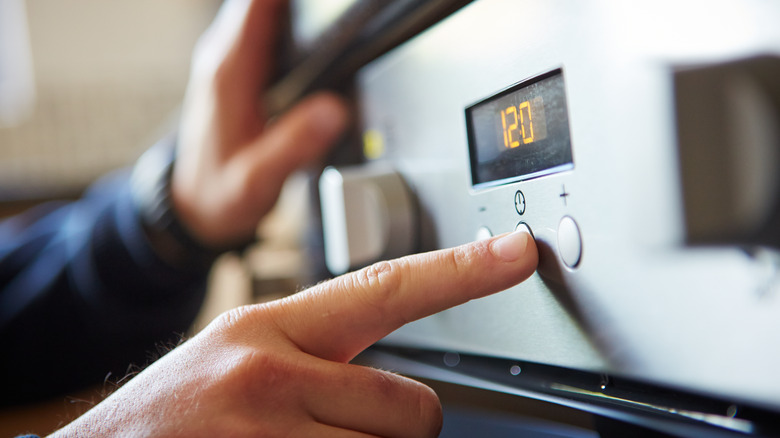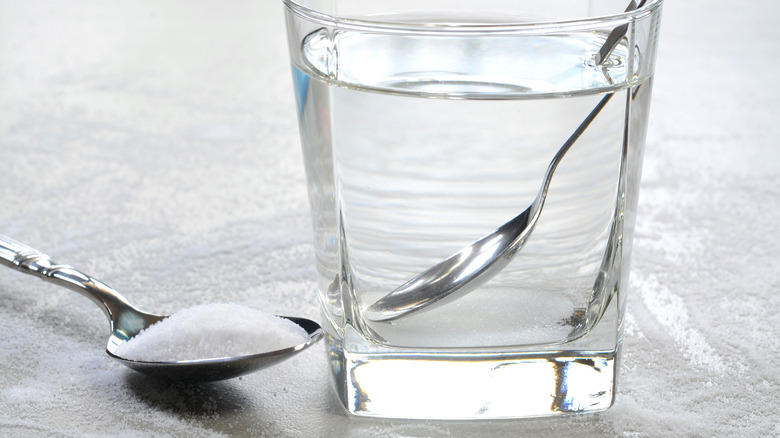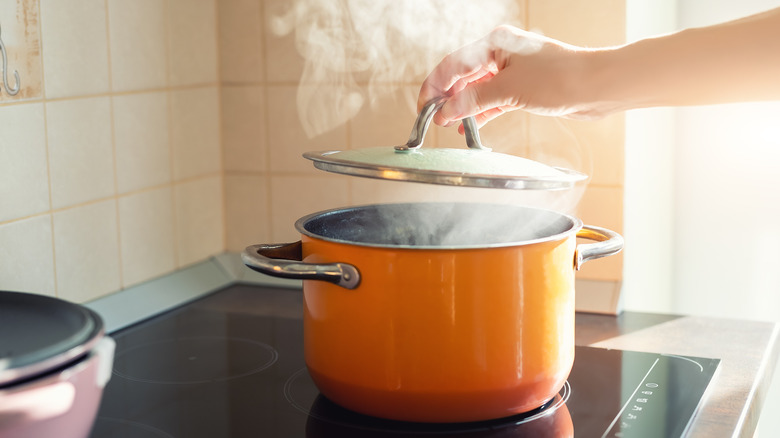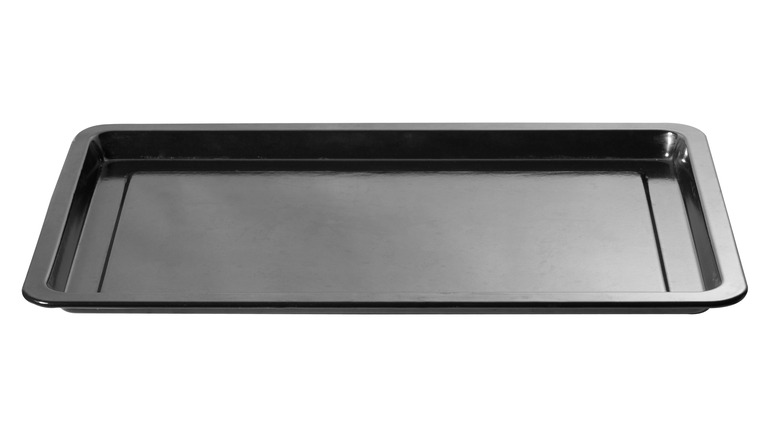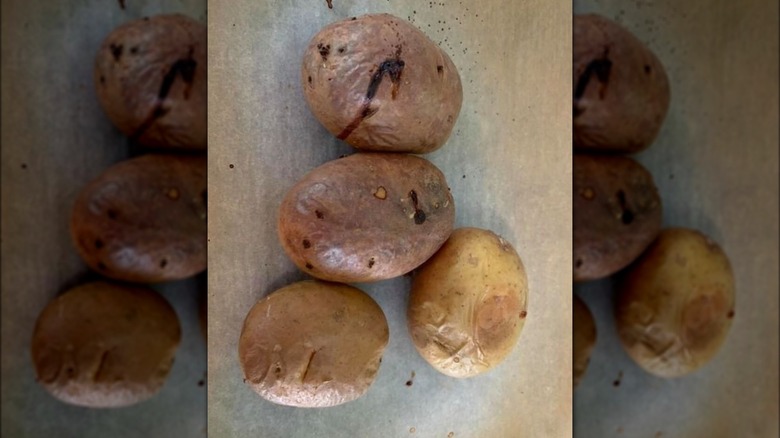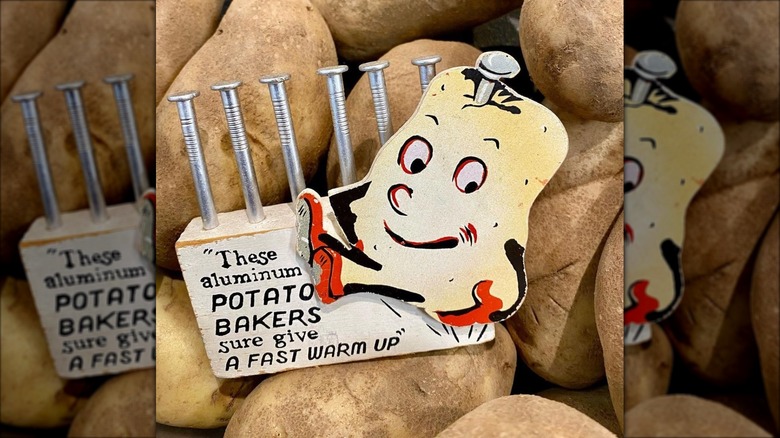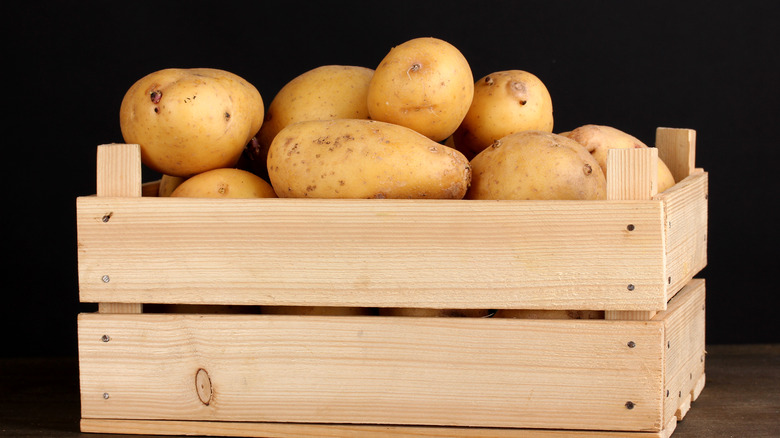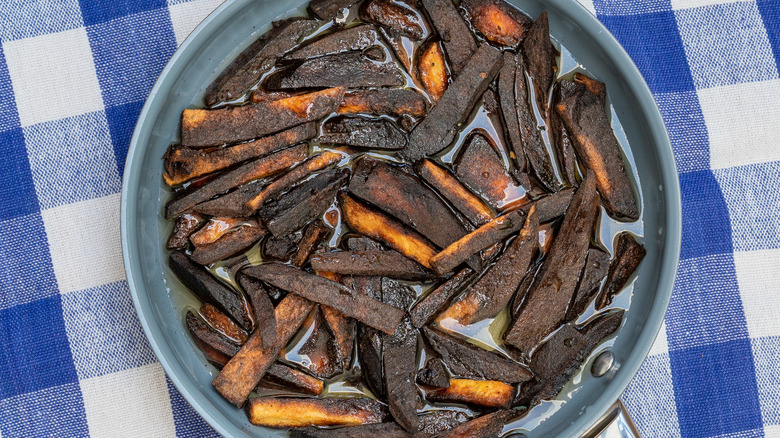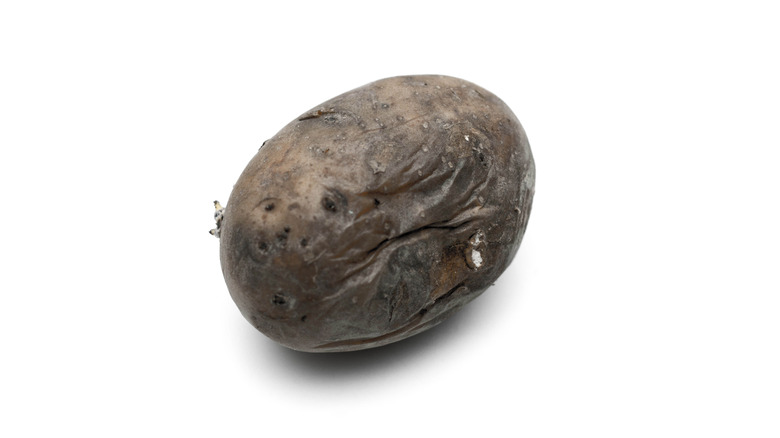Mistakes Everyone Makes When Making Baked Potatoes
One of the ultimate American culinary indulgences is the classic baked potato, which for some has surely managed to surpass mashed potatoes in terms of popularity and is seriously giving fried potatoes a run for its money. Whether you like them plain or stuffed with a generous serving of chives, bacon bits, and sour cream, chances are you're already in love with a good, old baked potato.
However, there are some complications to beware of when making your own baked potato. While you may believe yourself to be a potato expert, you could still be making a few key mistakes without knowing it. Fear not, though, as we're here to the rescue. To that end, we've compiled a list of some of the common traps people fall into when making baked potatoes.
Stay with us and you'll be serving the world's best baked potato in no time. Without further ado, let's discuss some of the most common mistakes everyone makes when making baked potatoes.
Using the wrong type of potato
Technically, you can use any type of spud for making baked potatoes. After all, a potato is a potato, right? But why not strive for perfection and save yourself the disappointment of eating bland and flavorless food? That's because the truth is that some types of potatoes are undisputedly the best for baking, with the right texture, skin, and flavor that make them the star of this dish. Others, not so much.
For perfectly crisp baked potatoes, russets are the way to go. They have higher starch content, meaning the cooked insides will fluff up nicely. Plus, its dry, white skin will crisp up to a gorgeous golden brown, just how we like it (via Baker Produce).
As one Redditor noted, russets are starchy potatoes that soften up under heat. Conversely, waxy red potatoes are a poor choice for baked potatoes, since they tend to hold their shape and won't cave under high temperatures. Make sure to use same-sized potatoes for consistent results, with medium-sized potatoes often being the best in this regard.
Not soaking the potatoes in cold water
According to one Redditor, if you want your baked potatoes to have restaurant-quality taste, make sure you don't skip the soaking step. The truth is that a simple soak will transform your potatoes from bland vegetable to favorite food.
The science behind this magic is simple. The soaking process, especially one that includes a pinch of salt, will allow the potatoes to soak up plenty of moisture. Per Blessed Beyond Crazy, you need to let the potatoes rest in the water for no longer than two hours. If you exceed this time, we're afraid you'll end up with soggy spuds that will have lost any semblance of good texture and flavor.
Once the moisture has seeped in, you can go ahead and continue with the rest of the steps to bake it. We think the result will be the epitome of deliciousness, resulting in the fluffiest, tastiest baked potatoes you have ever eaten in your life.
Not drying the potatoes
We hate to break it to you rush-and-hurry folks, but drying potatoes is kind of a big deal. Skipping this step is a culinary catastrophe waiting to happen.
The answer to your "What's the big deal?" is a sad, soggy mess of a potato that lacks the gorgeous golden crisp exterior that you so dearly covet. You really need to dry the spuds after washing, scrubbing, or soaking them so you can save your potatoes from turning into mush, per KitchenSeer. Moreover, one Redditor argues that this step is the key to making the skin crispy.
Use paper towels, cloth ones, or even napkins if that's what happens to be handy. We don't mind what you use, so long as it absorbs the moisture and, of course, is clean and sanitary. Leave the potatoes out in the open to air dry for good measure before you start working on them. You'll see that this step makes all the difference in the world and can help turn average baked potato ones into restaurant-quality spuds.
Forgetting to use the microwave
Finding out your baked potato is still hard despite giving it ample time in the oven is heartbreaking. Sometimes, the oven might be at fault, where the temperature may be too low for the heat to penetrate the skin and soften the insides nicely. A simple pre-cook in the microwave is all you need to ensure your potatoes finish up perfectly in the oven. We just don't recommend relying solely on the microwave. While you can cook potatoes entirely in the microwave, doing so will likely result in poor texture and bland flavor.
Per Boss The Kitchen, you can do a quick pre-cook in the microwave for just three or four minutes on both sides to ensure the flesh is nice and soft. Once that's done, you can proceed to bake your potatoes in the oven to allow the skin to crisp up and the flesh to become tender.
Just hit the potato button on the microwave for a pre-cook while your oven preheats. Moreover, a few minutes in the microwave also shortens baking time, so if you're in a hurry, it's always best to stick to this step.
Baking the potatoes in foil
Baking potatoes in aluminum foil is a big fat no — unless you don't mind eating baked potatoes that have been flavored with disappointment and sadness. This may come as a big surprise, though. You'll find that the internet is full of recipes calling for a foil wrap before you bake them in the oven, but don't be swayed by the fancy talk and the charm of a moist potato. Wrapping them in foil simply traps the moisture around your potatoes. When you pull them out of the oven, instead of baked spuds, you'll have steamed potatoes at hand. In short, you'll be presented with a soggy mess.
As per the Idaho Potato Commission, encasing a potato in foil is typically done to cut down on baking time. If you need to keep them warm post-oven, you can try using a bread warmer or place them in a heat-proof cabinet once they've been baked.
Kitchen gadgets won't give you a pass here, either. Even if you're making baked potatoes in an Instant Pot, foiling is not recommended. It simply slows down the cooking time and does nothing else, per a user on Facebook.
Not preheating the oven
Forgetting the preheating step is a rookie mistake, sure, but it's a mistake nonetheless. Preheating your oven can literally make or break your baked potato recipe. Per Food52, two elements affect the flavor and texture of the dish: time and temperature. Thrusting your food into a cold oven sets up your food for a disaster, with a bland flavor and not-so-perfect texture.
According to many recipes, you need an hour or so to cook a baked potato to the epitome of yumminess. This time includes a preheat, where the temperature should be set to 425 to 450 degrees Fahrenheit for best results. We've found that doing a preheat often cuts down our time in the oven, at least if we've timed it right. So, if you're in a rush, take a breath and remember to hit that "preheat" button first thing.
What's more, taking the time to preheat is also an excellent opportunity to check if your oven is working correctly. According to CNET, you can do this by using a thermometer to see if your oven is heating up to the temperature its display claims to have achieved.
Not using salt water for soaking
If you have been using plain water for soaking your potatoes, you're missing a key ingredient. Adding a dash of salt to cold water can seriously up your baked potato game. Since you're bathing them anyway, why not add a pinch or two of salt to help season the skin, add flavor, and crisp them up? Apart from getting a crisp exterior, we have found that potatoes taste an order of magnitude better after they take a bath in salt water.
It's clear that salt does wonders to the texture and taste of baked potatoes, but that's not the only reason you should be soaking potatoes in salt water. According to Boss the Kitchen, soaking potatoes in cold salt water also helps to remove a chemical called acrylamide from potatoes. This chemical is potentially linked to cancer, as per the National Cancer Institute, and is activated along with starch when potatoes are cooked under high heat.
Not parboiling the potatoes
Have you ever taken the fork to fluff up your baked potato only to find it raw halfway, and you're just standing there stabbing your way into the potato, hoping maybe, just maybe, there's still a way to save it? The savior, in this case, lies in parboiling. Parboiling is simply a fancy name for boiling something halfway. Not parboiling your potatoes is probably a mistake you didn't even know you were making, but we won't linger on the past. What you can do from here on out is parboiling your potatoes before the big bake. Essentially, when you parboil the potatoes, they will be cooked halfway before hitting the oven.
According to Bob's Red Mill, parboiling gives you several advantages, like reduced cooking time. That's especially useful for big spuds, of course. Plus, parboiling gelatinizes the potato's skin, which helps it turn a golden brown that may just make you shed a tear or two from sheer joy. Just remember to dry the potatoes off before transferring them to the oven.
Not preheating your baking tray
Preheating your baking tray is nothing short of a magic trick. But why bother? Per The Argus, every oven can have uneven heating that leaves some areas undercooked and others overcooked. Preheating your baking tray helps to ensure that your food cooks up nice and evenly. For hefty potatoes that need just the right time to cook through, this could make a big difference.
Furthermore, this step also saves time by cooking up your potatoes relatively quickly. Since the oven tray is already hot, your potatoes will immediately start simmering in the heat, ready to become a delicious hot meal. Preheating your baking tray is as simple as it sounds. Simply toss the tray into the oven and let them both preheat as you dial your desired temperature.
As if that weren't enough, consider how this step can bump up a potato's texture. One Quora user who works at a restaurant suggests preheating a pan in the oven to help create a crust on baked goods — just what we want for a baked potato, too.
Forgetting to poke holes in the potatoes
If you've forgotten to puncture your round veggie, chances are you might hear a loud thud in the oven: the sound of exploding potatoes.Making holes in your potato frees steam from the tiny little exits you've created. Otherwise, the buildup of heat and steam and your potato will explode, making you scream bloody murder in the middle of the day.
While it doesn't happen all the time, and we might just be exaggerating a tad bit, it's always best to err on the side of caution. Food52 notes that since potatoes are full of water, the steam will build up, and the skin will act as a barrier. To prevent them from bursting, it's best to poke them with the tines of a fork. Also, you're more likely to have a potato explode when baking them in the microwave than in the oven.
A Facebook user spills the beans on how restaurants make the fluffiest baked potato. They pop holes in the potatoes and then bake them in olive oil and salt. What's more is that the insides of the potato are likely to be penetrated with flavor this way, giving you the most seasoned baked potato out there.
Not using potato nails
Often we're in a rush and just wish for a magical wand that can produce baked potatoes in a second. We're here with a little less hocus pocus and a bit of science instead. The magic wand, in this case, is a potato nail.
According to Spuds Spikes, this add-on can decrease the time in the oven up to 50 percent, depending on size and variety of the potato. The idea is that these steel nails will conduct heat to the middle of the spud, while lending strength and structure to your potato.
Chef Cristian Feher explains that these screws or nails act like a lightning rod that transfers heat from the oven to inside the potato to help it cook faster. This hopefully means that you won't be biting into any hard spots. If your nail slides out easily, your potato has done its time in the oven and is ready to be served.
Not removing the black spots before baking
When making many potato dishes, you've likely encountered black spots. These spots, although edible, are undesirable and visually unappealing. According to Home Cook World, these spots indicate that the potatoes have been handled roughly, resulting in bruised skin. These dark blemishes also mean that bitter-tasting chemicals have been released into the surrounding flesh, obviously affecting the taste of the potato.
Therefore, it's best to cut and throw away the bruised section so you don't compromise the flavor of your baked potato. If you encounter a blackened area after the potato has been cooked, you can easily scrape it away with a fork or knife.
Per Leaf, there's a second kind of dark spot that you may encounter when working with russet potatoes. This one features a long dark passageway known as a "hollow heart." Don't worry about the creepy name, though, as it's not harmful. It's basically a deformity. Simply scrape it away and enjoy the rest of the potato.
Baking at high temperature to save time
When you're in a hurry, you might be tempted to turn the heat up a notch just so your food can cook up quickly or you can achieve perfectly crispy skin. Resist that urge, though, lest you experience some drastic potato baking consequences. Regardless of the motive, you need to be mindful of the temperature when you're baking baked potatoes.
Tastessence suggests that the oven temperature for the perfect baked potatoes (at least, those of a medium size) should be between 400 to 425 degrees. The Idaho Potato Commission likewise recommends baking at 400 degrees Fahrenheit for an hour in the oven. A perfectly baked russet potato should have an internal temperature of 210 degrees, as well. If you turn up the temperature too high and skimp on cooking time, you'll have an uncooked center and a burnt-to-crisp outer skin of the potatoes.
Using overripe potatoes
While these particular spuds may be just about perfect for making mashed potatoes, overripe potatoes are a big no-no when it comes to baking. Soft potatoes have lost their moisture, according to PureWow. Dry, shriveled, and soft spuds will no longer give you a texture that's worthy of a baked potato. A surefire way to tell if your potatoes are overripe is to touch them. Potatoes that are slightly soft with only a few sprouts are edible and fine to eat. However, any softer, and we're afraid they won't work for baking.
Even if you use mildly soft potatoes to make baked potatoes, you're still running a risk. Foods Guy explains that, at this stage, the potatoes you're hoping to use just aren't at their best. Apart from issues with texture, soft spuds will often lack the more rich flavor you would otherwise get from a fresh potato.
